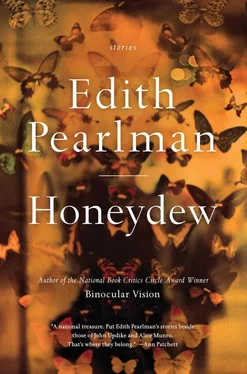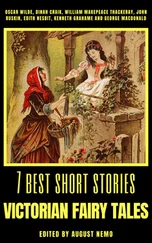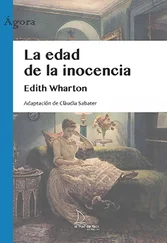Then she turned off again, along a second path that led to a narrow river with a gentle decline. The water splashed swiftly through groups of pearly rocks, then leveled. She called this little plaything of nature the Falls. Alders by the side of the brook were dropping leaves thin as tin. Cylinders hung in tiny clusters from their branches, protecting the pollen of the spring to come. On the other side of the river the ground was green with tiny, ivy-leaved veronica boldly rising. They would straggle through the winter and in April greet the sun. And greet Ingrid too — she often visited in April, when the opera season was over. Nearby, unseen, caterpillars were spinning their cocoons.
She noticed one day that a black stone was awaiting her on the path. She picked it up. Partially smoothed and also jagged, veined with green, it seemed to throb on her palm. She slipped it into her back pocket.
From these private Falls, she returned to the main path and went on to the woodworking shop. There, as Chris had predicted, she deftly handled the business of the business. Her office was a little doorless room off the large shop floor. During her few idle minutes, she watched the men at work. She saw chests and dining tables and moldings in the making, and sometimes an artistic element — an elaborate architrave which would surround a simple window. She thought briefly of her own slatted Manhattan blinds. She admired the tools: drills and chisels and gouges and what seemed like hundreds of kinds of saws. She loved the planes that lifted a thin epidermis from a plank. There wasn’t much conversation on the floor, although one man, Danny, older than the others, sometimes took his break at her desk and talked about his beekeeping. He lived alone in a cottage and grew vegetables. He told her that the black and green stone now resting on her desk was chromite. The rough part could be smoothed. “I know a silversmith who could set it, and you could wear it dangling from your neck.”
My long, long neck… But she didn’t say that. “I don’t want to tamper with it” was what she did say.
At the end of the day she tramped back through the woods. At the familiar black stove she prepared dinner with Lynne and Chloe. Then came the eating of dinner, and the washing up, and then Sorry! or television or reading. They had no stereo. She wanted to give them a piano but they wouldn’t accept it. She could will her own Steinway to them and then fling herself onto the Falls, but she’d just smash her kneecaps on the rocks.
Sometimes, in the late afternoon, if Chris had loaned his pickup to someone, that someone drove him from the pellet plant to the shop. From there, Chris offered to walk her home, grave as a suitor. He pointed out things that she was not yet clever enough to notice: the hunting spider, which does not build webs but instead spies her prey and chases it and pounces. He showed her a toad crawling to his death while nearby a generation of tadpoles, some of them his progeny, sped through the water. His fingers lifted a low branch and there bloomed a miniature plant with a tiny dark flower: a plant that lives its whole life under a leaf, hostage to its own nature, visible to no one except some expert winged pollinators. Its story would make a good opera, Ingrid thought; no, not an opera, a ballet, a ballet meant for children. She imagined lines of well-dressed kids and their grannies lining up to see The Lonely Flower. If she were in New York she’d be obliged to take Allegra’s grandchildren…She was still squatting to peer at the flower. Getting up wasn’t as easy as it had once been. Chris held out his hand.
In the evening Danny sometimes dropped in. His bees were swarming, he told her. The queen mates with a few lucky drones — they are her sons, if you want to be accurate, sometimes her grandsons. Nature is no respecter of seemliness.
Happiness lengthens time. Every day seemed as long as a novel. Every night a double feature. Every week a lifetime, a muted lifetime, a lifetime in which sadness, always wedged under her breast like a doorstop, lost some of its bite. When she went back to New York she would feel that a different person had occupied her body for a while, and a different wardrobe had taken over her closet — now she wore only tees and jeans. The stone had found a proper home in her back pocket. The V-necked blouse had been shoved into Fido. Her hair was of course longer, its seemingly random stripes of chestnut — how clever her hairdresser was, how natural they’d looked — now surrendering to honest blond-gray. Brown, pale yellow, gray — she was coiffured in wood bark, wood pulp, and dust. Her glasses were permanently bent because Danny had sat on them. She could probably be mistaken for a displaced bag lady. Or a beaver, who lived among trees and water and other beavers, and feasted on cellulose.
In November she went back to New York for a few days. Allegra had died.
“I’m sorry for your loss,” said the well-brought-up Chloe. “Come back right away,” she then commanded. “It’s more fun when you’re home.”
“Keep the chromite for me,” said Ingrid. “Rub it once in a while.”
In her ragged state, Ingrid attended the funeral and then went to Allegra’s apartment. Everybody recognized her except for one woman she had never liked, who glared as if she were a hillbilly freeloader. But other friends asked eagerly when she would return to New York. “I’ll be back soon,” she promised. She visited a gallery she admired, and also the optician.
And again the big plane, and the talkative moving walkway, and the small plane, and the bus. She stepped down off the bus into tiny Chloe’s arms; into Lynne’s arms, not much bigger; into Chris’s gentle, huge embrace. From the backseat of the car she saw the house over Lynne’s shoulder. In the late afternoon of the late fall day, the stones looked mauve, a color borrowed from Odilon Redon. Should she mention that? She should not. A rabbit from the woods was chewing on a carrot that Danny must have dropped.
Sometimes the college hosted a quartet or a singer for an afternoon concert. One principal violinist rose up and down on his toes. A poorly modulated soprano projected into the next county. But there was a good second-rate pianist, and Chloe and Lynne listened attentively, and Ingrid, leaning forward, listened hungrily until the last almost-good arpeggio. She felt Chris’s eyes on her. Afterward they went to their favorite restaurant. The waitresses were in their fifties and wore aqua dresses under white aprons. The lamps in the booths were pleated. There was always meat loaf on the menu, and crab, and a vegetarian special. The corn bread was the best she’d ever tasted. They ate from one another’s plates like any family — two big people and two little ones.
When they ate at home, Chris served from the head of the table, handing Ingrid the first plate, his thumb flipping a stray string bean back among the others. After dinner, when Ingrid read to Chloe, she read fairy tales — they both had a taste for make-believe, especially if royalty was involved.
“You’re our queen,” Chloe said one night.
“Queen Giraffe?”
“Yes! Daddy is the Lion King and Mommy’s one of those little princesses that gets stolen or put to sleep for a while.”
Lynne was doing laundry and missed the exchange. “And what are you?” Ingrid asked.
“The nightingale the king can’t live without.”
Stones figured in many tales, inert minerals transformed into active participants. They induced love, they captured memories, they murdered ogres, they arranged themselves on the path so that Hansel could find his way home.
Some evenings, when Chris put his feet up on a particularly ugly brocaded ottoman and closed his eyes, Ingrid and Chloe and Lynne busied themselves in the kitchen making a pot of soup that would last a week. Lynne’s garden supplied herbs. Chloe threw in the chromite. Ingrid muttered some syllables. “That’s an incantation,” she invented.
Читать дальше












